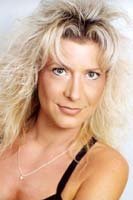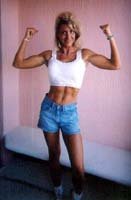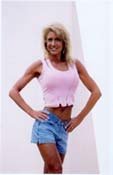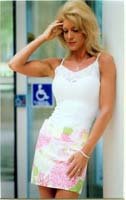
[ Q ] How long have you been a photographer?
-
A: Eighteen years.

[ Q ] Do you prefer film or digital photography and why?
-
A: Well, I'm used to film. I know how it works and responds and I enjoy using it, which I believe shows in my work. Usually I don't need to preview or see an image right away.
I enjoy using cameras that don't require batteries, are simple to use, and don't get in the way of my shooting style. The viewpoint of, "less is more" has been a successful guide for me.
When I need a digital image, then I'll scan the film. However, for the type of fine art photography that I do, I prefer film. Many photographers prefer digital equipment for many applications and that's fine, too!

[ Q ] Should models seek out photographers that use film or digital methods?
-
A: Consumers will do best choosing a photographer based upon image style and product quality. If deadlines are important, that too, must be taken into consideration.
Both film and digital are capable of producing quality results, so really the issue is the style of the photographer and the final product.

[ Q ] Are there certain colors or patterns that are best to wear for a photo shoot?

-
A: Most photographers have their own preferences and style. I prefer clean and simple; avoiding busy patterns, loud colors and clothes that are overly trendy.
Choose clothes that enhance rather than compete with your personality. Bring another outfit with you to a shoot even if your plans are to photograph only one outfit. Choices are always handy for both the photographer and the client!

[ Q ] How important is makeup for a good photograph?
-
A: I believe professional makeup is a required element for all portrait shoots. In my days of doing studio photography and working with a makeup artist with television experience, I knew that clients who chose to have professional makeup applied were much more likely to be satisfied with their photographs than those who declined to have their face prepared for the camera.
 |
||||
 |
|
 |
||
 |
||||
This is a critical issue that many clients and even photographers fail to comprehend or appreciate. However, to complicate the matter further, I've found very few cosmetic artists trained in the proper application of photographic makeup and usually stock makeup not designed for studio lighting.
Generally speaking, department store makeup will not produce acceptable results. Ideally, as the bottom line, I would seek out makeup artists who have experience working for television or cinematography studios. Check their credentials and portfolio to determine if their work meets with your approval.

[ Q ] Should men also consider makeup?
-
A: Absolutely, yes! Properly done, makeup will not be seen in the photograph. It simply serves the purpose of smoothing the complexion and providing a pleasing color balance.

[ Q ] How can someone locate a good photographer in their area and what questions should they ask?
-
A: Try contacting local modeling agencies to inquire of the photographers they are using for their needs. As an alternative, inquire of local photography associations such as the American Society of Media Photographers (ASMP) or Professional Photographers of America (PPA) for their list of photographers specializing in fitness modeling. Again, the key is to review each photographer's portfolio.
If you like their work and style, and they can deliver to you the portraits you need in a timely manner, try them. When you meet the photographer for the first time, ask yourself if he/she appears professional and is courteous.
Are the studio and the furnishings reflecting the style and look that you want in your photographs? Can he/she meet your requirements within your budget?

[ Q ] What about price? Is it true that you get what you pay for?
-
A: Usually, yes.

[ Q ] Are there things that people can look for as signs of inferior photography?
-
A: My leaning is towards prints that are produced through a wet process. In other words, a client should avoid low-end inkjet prints, especially if they are paying a premium price.
In addition, clients should never accept photos that display poor lighting (i.e. harsh shadows), inappropriate backgrounds (i.e. gaudy colors), and tacky props.

[ Q ] What can someone expect to happen at a typical shoot?
-
A: If a professional makeup artist is employed, the client should contact the artist to determine how to prepare the face prior to arrival at the studio. Many makeup artists would prefer that you arrive before the shoot with a clean face with no makeup.
Normally, you should allow time to prepare your hair, makeup and clothes. Try to be as comfortable and relaxed as possible. Discuss with the photographer possible music that could be played during the shoot that would help with mood.
Be prepared to follow the instructions of the photographer. An average shoot takes from thirty to sixty minutes to complete.
 |
||||
 |
|
 |
||
 |
||||

[ Q ] What is the biggest, single piece of advice you can give to someone to help make a photo shoot successful?
-
A: Have a positive attitude. Your attitude will show in your photos!
About The Photographer:
 Peter J. Blackburn is currently a fine art photographer specializing in four-color gum dichromate printing.
Peter J. Blackburn is currently a fine art photographer specializing in four-color gum dichromate printing.
In addition, he has experience as a studio photographer shooting both commercial work and portraiture.








